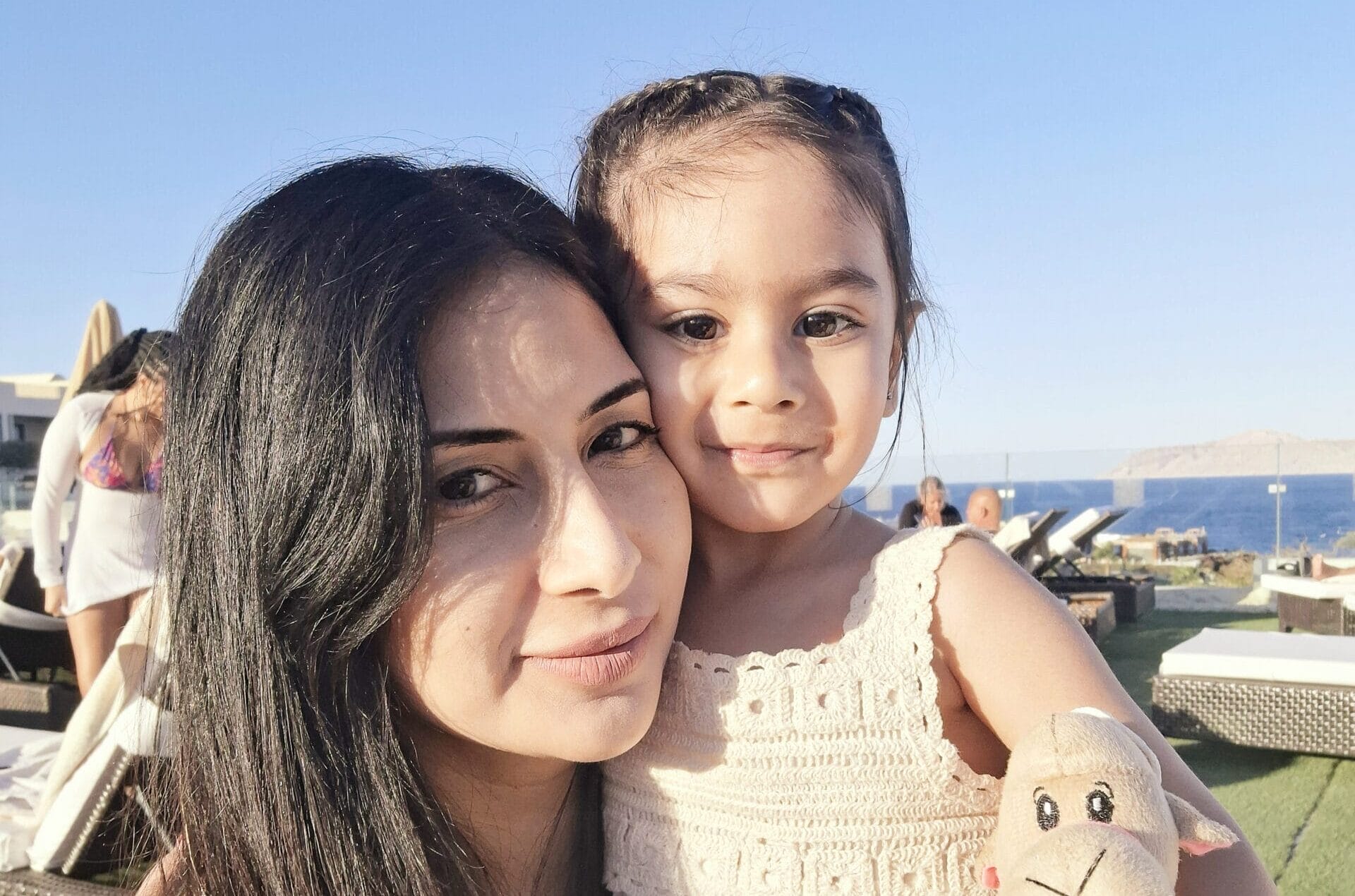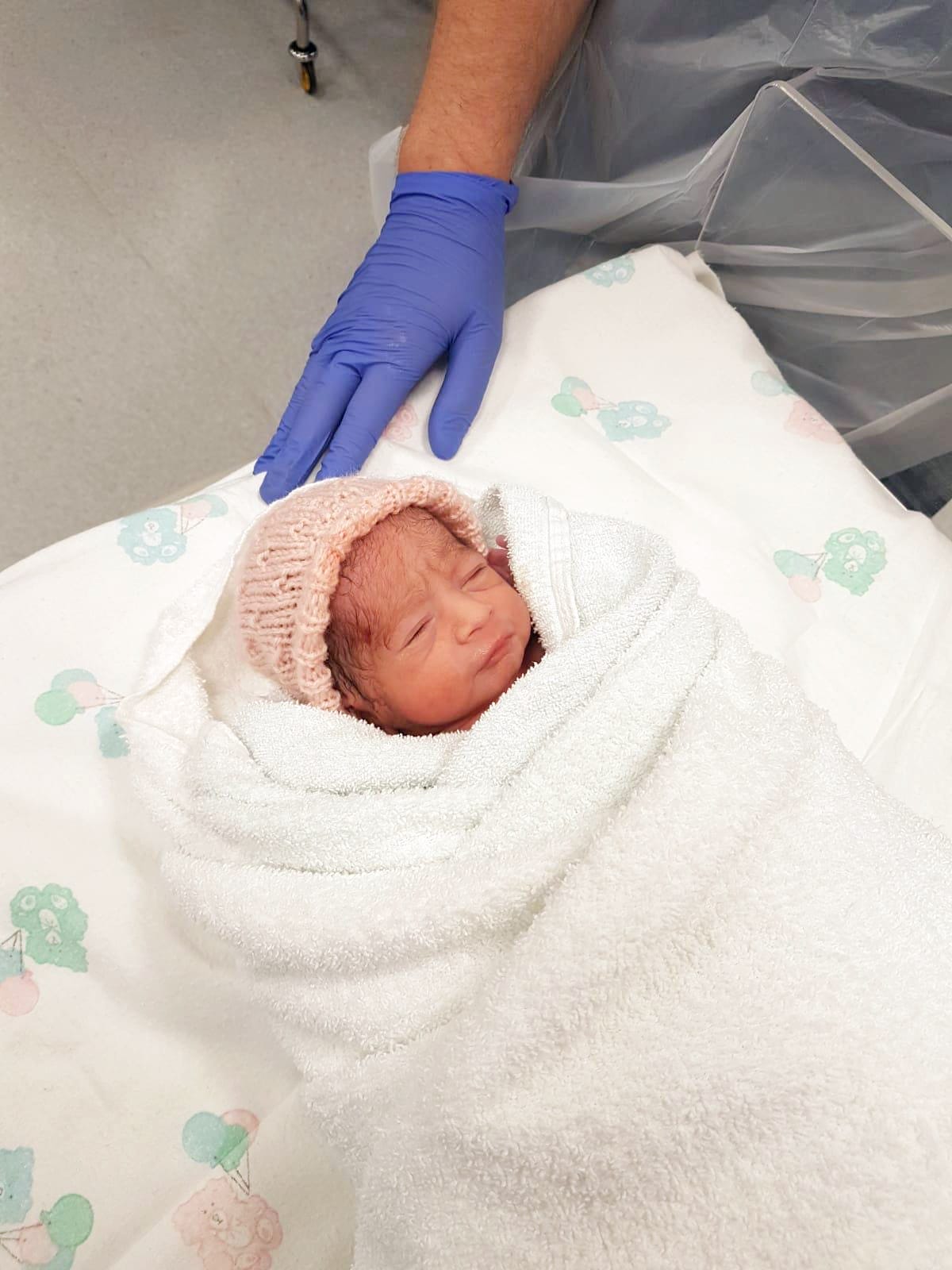HOPE FOR FAMILIES
Nina Dutta, 35 from Leeds, shares how Wellbeing of Women is giving hope to women and families through its research

Nina Dutta has always dreamed of being a mother and was thrilled to find out she was pregnant in 2018. However, a few weeks later, when Nina was 12 weeks pregnant, she experienced a massive bleed.
“To my absolute shock, I was told I was experiencing a complete molar pregnancy. This is a rare condition that happens when a sperm fertilises an empty egg that contains no genetic material from the woman, so a baby does not develop. I had never even heard of it until then.”
Nina had surgery to remove the molar tissue, followed by six months of monitoring from a specialist team at Weston Park Hospital in Sheffield, as there is a small risk of molar cells becoming cancerious. After six months, Nina was given the go-ahead to try again for a baby. “I got pregnant on the first try, but this time I felt extremely anxious. I had an early scan at six weeks, which gave me some reassurance it wasn’t another molar pregnancy, but the anxiety wouldn’t completely go away.”
At her dating scan, Nina was told the baby was measuring slightly behind, then her combined screening test revealed she was high risk. “The doctor told me my PAPP-A – which is a portein produced by the placenta – was extremely low, which may indicate placental problems. At 15 weeks, the consultant told me the baby was so far behind now it wasn’t going to work out. She suggested I have a termination, which I made the very difficult decision to do.”
Nina’s pathology report showed she had a placental disorder called Chronic Histiocytic Intervillositis (CHI) and for her next pregnancy she was put on a treatment regime under the care of Dr Emily Cornish’s team at UCLH and her local hospital, which included immunosuppressants, blood thinners and aspirin. “I felt hopeful, as it was strong medication – the same medication organ transplant patients are on – so I was sure it would work. However, when the baby’s growth started to fall back again and my screening came back with low PAPP-A, I knew it wasn’t going to work out.”
Nina sadly lost the baby at 15 weeks. “I was in a very, very bad place and just couldn’t stop wondering why all these things were happening to me. I thought my case was really bad and nothing was going to work.”
Nina’s treatment was changed with input from a specialist team in Manchester and she became pregnant. “Things began going wrong at 15 weeks, with my baby measuring behind and the amniotic fluid being extremely low. I went to the hospital every week for a scan to find out if the baby was still alive, which was very difficult.”
At 28 weeks, Nina’s baby sadly passed away. “I was exhausted, deprfessed and obsessed with trying again. The only thing that kept me going was the fact the doctors hadn’t given up on me.”
Nina decided to try one last time for a baby, and if it didn’t work out, she would explore other olptions for having a child. “This time the two previous treatments were combined and in November 2021 I became pregnant. Miraculously, the treatment worked and at 33 weeks, my daughter Aarya was born healthy and well. It felt amazing beyond words to finally have my baby in my arms after such a long journey and I felt like I got my life back from that day.”

“It has taken three different specialist teams for me to finally have a baby, and I cannot thank them enough for carrying out research into this awful disease. When I first met Dr Cornish, she had just received a grant from the charity Wellbeing of Women towards her PhD to fund the research she was doing into CHI to further improve knowledge of the condition. I am so grateful for this research as there is not much knowledge out there even among medical professionals, as I discovered following my diagnosis. If I hadn’t found the knowledgeable doctors I did, and they hadn’t had access to the research they did, we wouldn’t have Aarya now.
“There are other women still really struggling with this disease and other causes of baby loss due to the lack of knowledge and expertise. The more research that can be done – and the more awareness that can be raised – the more it will help all the women, like me, that struggle to have the family they dream of.”
THE CANDIS BIG GIVE AMOUNT RAISED: £14,260
- Wellbeing of Women funds research, campaigns and health information for gynaecological and reproductive health.
- In the UK, it is estimated that 250,000 miscarriages and around 2,500 stillbirths happen every year, meaning around one in four pregnancies end in loss. Often the cause is unknown. There is a need for increased funding and research to better understand and prevent miscarriages, and to support those affected by pregnancy loss.
- The money raised in the Candis Big Give will help the charity to continue to fund its groundbreaking research into miscarriage and stillbirth. By funding research to better understand the different causes of miscarriage and stillbirth, it hopes to gain new insights, improve treatment and care of pregnant women and influence healthcare practice for the better.
- It is currently funding Dr Michael Wilkinson’s research exploring if low-dose steroids could improve blood flow to the placenta, reducing the risk of foetal growth restriction that can cause miscarriage or stillbirth.
- It has also funded research by Dr Emily Cornish, who has been studying the causes of rare placental disorders and promising potential treatments.
- Visit wellbeingofwomen.org.uk
WOULD YOU LIKE TO HELP IN SUPPORTING HEALTH CHARITIES
Your gift subscription will help to support health charities
SUBSCRIBE